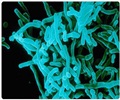There is a need for greater co-operation between governments, corporate sector and citizens to ensure international preparedness and to provide a universal safety net to deal with global health issues

The pressures of the exploding population, urbanization, environmental degradation and changing climate, provides ample opportunities to the microbes- blessed with the ability to mutate and multiply- thereby challenging human existence. Misuse of antibiotics is another factor that worsens the already- grave scenario. Drugs are unable to match the pace at which the resistant variety evolves. Some of the ominous organisms doing the rounds are HIV/AIDS, Ebola, Hanta, Hendra, Nipah, H5A1 causing avian influenza, new variants of the bacterium causing epidemic cholera, microbes responsible for Legionnaire's disease and meningitis.
These disease outbreaks are historically unprecedented and are a far greater threat today than they were three decades ago. They maim the existing global economy and stretch the health system in every country, adding to their burden. Unless drastic measures are adopted, this trend is likely to continue. No country is singularly equipped to deal with a crisis of international proportion. Increased collaboration among the nations of the world will help in the timely management of epidemic- prone disasters. There is also a need for greater co-operation between governments, corporate sector and citizens to ensure international preparedness and to provide a universal safety net to deal with pan-global health issues.
Source-Medindia
 MEDINDIA
MEDINDIA
 Email
Email








